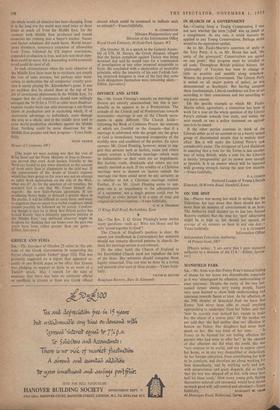MANSFIELD PARK
Stx,—Mr. Amis says that Fanny Price's natural feeling of shame for her home was discreditable, especially as it was 'unmitigated by affection, understanding or even tolerance.' Despite the rarity of the two last- named virtues among very young people, Fanny very soon learned to show both understanding and tolerance towards Susan at least. As for affection, in the 39th chapter of Mansfield Park we learn that Fanny 'had never been able to recall anything approaching to tenderness' from her father, and that 'now he scarcely ever noticed her, except to make her the object of a coarse joke.' Of the mother we are told that 'she had neither time nor affection to bestow on Fanny. Her daughters had never been
much to her. She was fond of her sons. . . Is Fanny to be blamed for not feeling affection for parents who had none to offer her? In the absence of that affection she did what she could. She was 'very anxious to be useful, and not to appear above her home, or in any way disqualified or disinclined, by her foreign education, from contributing her heir' to its comforts, and therefore set about working for Sam immediately; and by working early and late, with perseverance and great dispatch, did so much that the boy was shipped off at last, with more than half his linen ready.' How many young girls, finding themselves unloved and unwanted, would have shown so much good will, self-control and altruism?—Yours
































 Previous page
Previous page